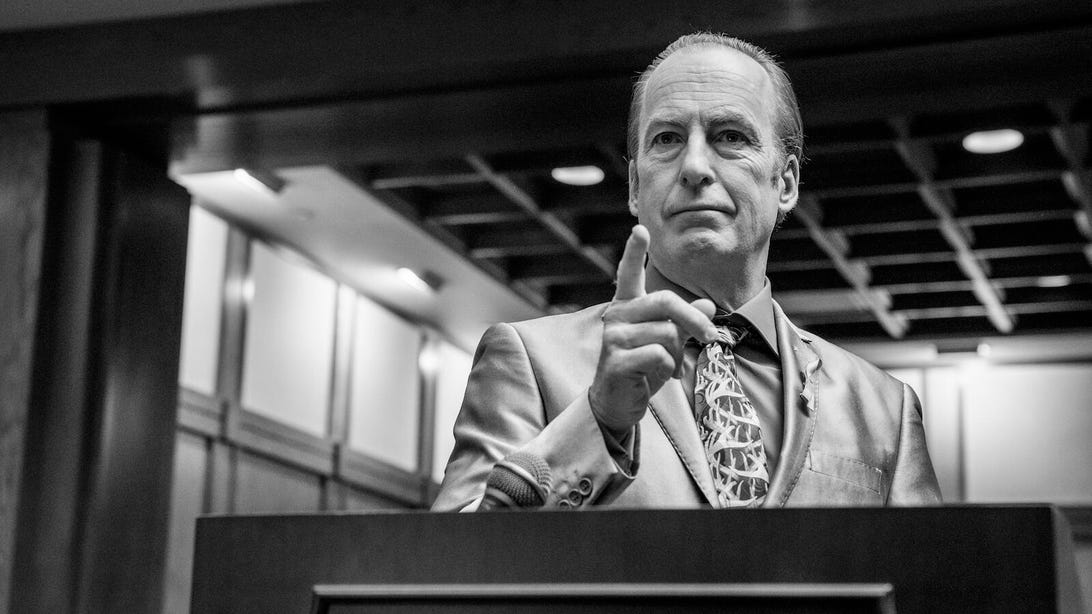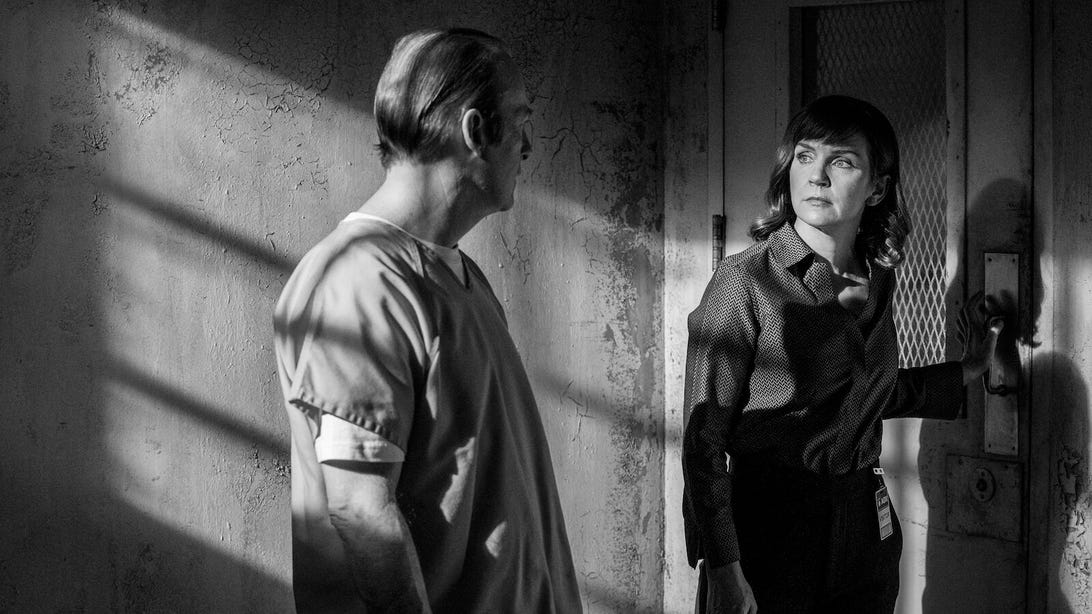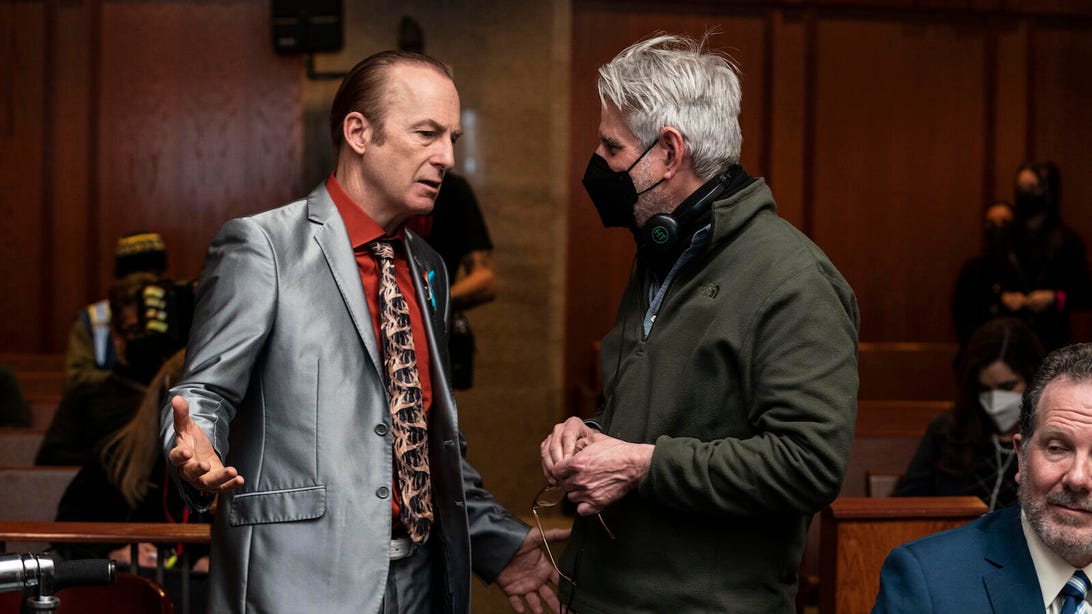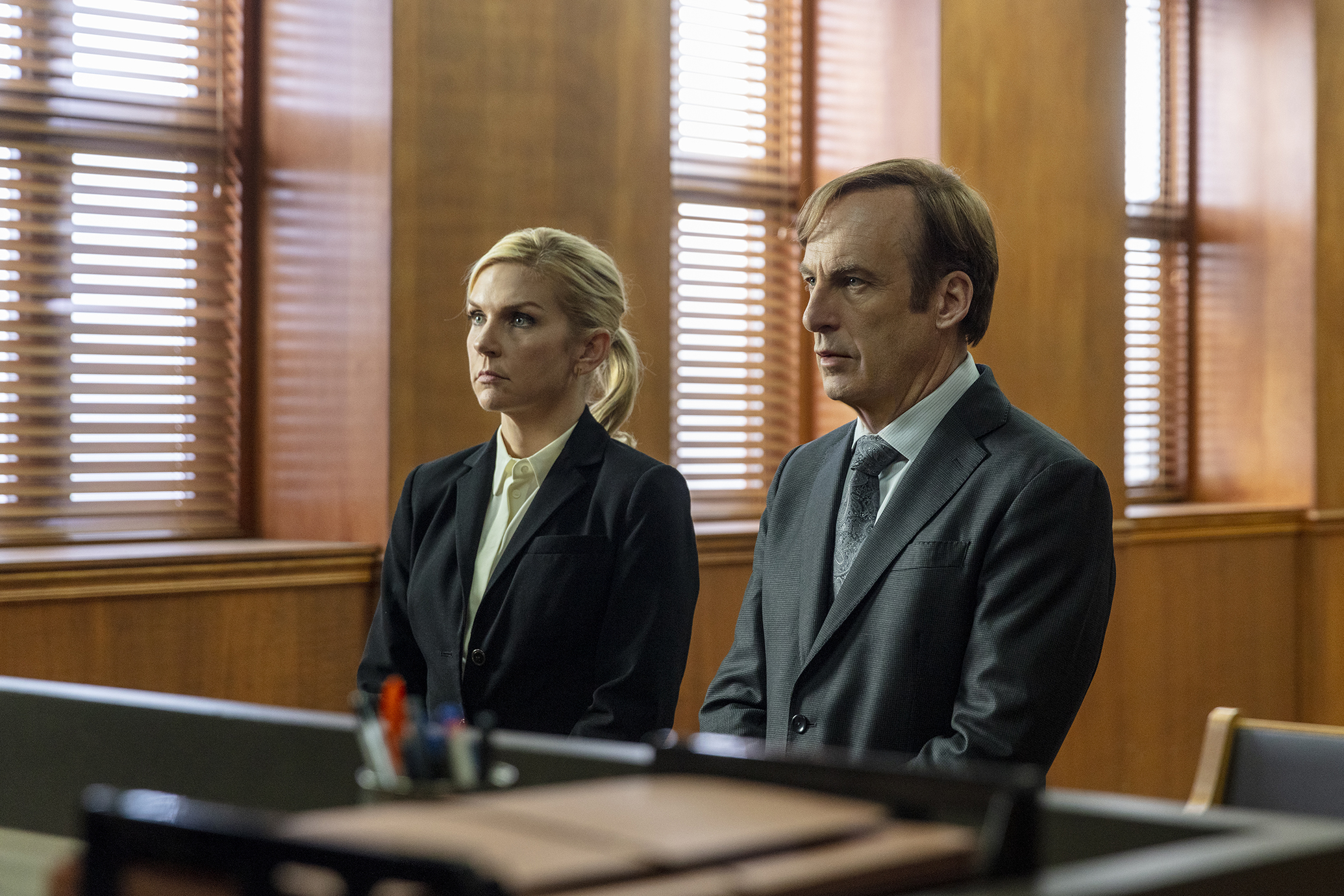Join or Sign In
Sign in to customize your TV listings
By joining TV Guide, you agree to our Terms of Use and acknowledge the data practices in our Privacy Policy.
Better Call Saul Stars and Showrunner Reflect on Where Jimmy and Kim Go After the Series Finale
'He's got his soul back. And Kim has her agency back'

Bob Odenkirk, Better Call Saul
Greg Lewis/AMC/Sony Pictures Television[Warning: The following contains spoilers for the series finale of Better Call Saul, "Saul Gone." Read at your own risk!]
In the end, Better Call Saul was a love story. Or was it a redemption story? If you ask Bob Odenkirk and Rhea Seehorn, it was both.
The last moments of the series finale, fittingly titled "Saul Gone," saw the re-emergence of Jimmy McGill (Odenkirk) from where he'd long been buried under Saul Goodman and Gene Takovic and a much more sinister fourth persona who came dangerously close to killing Marion (Carol Burnett) in the penultimate episode. He'll likely spend the rest of his life serving out an 86-year prison sentence; it could have been just seven years (plus a pint of "really good ice cream" once a week), but after spending so long hiding and running and scamming, Jimmy found his absolution in knowing when to stop the act. He orchestrated his own ego death for himself, for reasons of personal catharsis and of giving himself a proper punishment. But he also did it for the chance to share a cigarette with his ex-wife — love by way of redemption.
Odenkirk spoke of that scene, which saw Kim (Seehorn) visiting Jimmy in prison and smoking with him in a poignant, noir-infused parallel to the show's very first episode, during a press conference held the morning after the finale aired.
"It's that thing of getting past all your illusions, or the ways in which you're hiding, [which] allows you to feel and share your love the most," Odenkirk told reporters. "These two people really let everything drop away, all the ways in which they were trying to avoid the consequences of what they'd done, and they just honestly presented themselves to the world. I think the redemption comes first, and then they were really able to look each other in the eye and know that they shared their experience on planet Earth together in a full way."
Seehorn was in agreement, adding that she found the cigarette scene (the very last scene they shot for the series) to be about "letting go of your upbringing and the baggage that you bring into a relationship, to be a more authentic you, and to make decisions based in the present, which is where they are truly existing in the last scene."

Bob Odenkirk and Rhea Seehorn, Better Call Saul
Greg Lewis/AMC/Sony Pictures TelevisionPeter Gould, Saul's co-creator, who also wrote and directed the finale, found it to be a bit more complicated, questioning whether he believed Jimmy would ever be able to redeem himself. "I think they've always loved each other, but love isn't always the answer. Love is central to our souls and to our beings, but it can be like any other volcanic force, it can be used for good or for bad. Redemption's a big word. I don't know if he's redeemable. It's hard to think that he could make up for the things he's been part of. I don't think he really can. That's the time machine part of it." Still, it doesn't make what Jimmy's done any less crucial. It may have meant something even bigger: "He's got his soul back. And Kim has her agency back."
Jimmy's admission of guilt, not just in helping build Walter White's (Bryan Cranston) empire of destruction, but in his role in the death of his brother, Chuck (Michael McKean), isn't what gives Kim her agency — she'd already begun tentatively picking up the pieces of her former self in Florida, where we saw her offer her services as a volunteer at a free legal clinic before she even knew Jimmy was being tried in Albuquerque — but it's monumental in helping set her free.
"We did want to stop just short of it being totally comedic," Seehorn said of Kim's life in Florida, where she spent her days working a desk job at a sprinkler business and having bland, opinion-free conversations with her coworkers. "This is not a mockery of these people. It's just that it is passionless for Kim. It's a muted version of what we've seen her to be."
It speaks to the respect Saul has for its characters that Jimmy's final transformation is what helps usher Kim into the next phase of her life. He can't help her without first helping himself, and it's in the courtroom scene, a sprawling sequence overflowing with symbolism and references that rewards Saul's eagle-eyed audience for their years of close reading, that he's able to do so. He starts to give the same version of the insincere speech he'd given Marie (Betsy Brandt, in easily the most thrilling and meaningful of all the Breaking Bad character cameos) before pivoting to a confession, looking at the judge but speaking directly to Kim as he seals his fate.

Bob Odenkirk and Peter Gould, Better Call Saul
Greg Lewis/AMC/Sony Pictures Television"All the selfishness and the shallowness of Saul Goodman is a choice. Mostly a conscious choice, but some of it is just this overzealous protecting of his heart," Odenkirk explained. "I think he does know better. I think he always knew better. And that's why I love the ending. Because he exhales, he looks back at Kim in that courtroom scene. He thinks he's sort of done something pretty clever and then he realizes it's not really enough. It's not a full confession, and it doesn't show the extent of his self awareness and his bravery that he can call up, and that he's capable of, and he does it. He does that in front of her, and shows her who he can be."
Better Call Saul has always been a show about, in Gould's words, "what could've been." To regret is to force yourself to reflect, something Jimmy (or Saul, or Gene) has not been capable of doing before now. He can never undo the things he's done, so he's instead chosen to repeatedly reinvent himself rather than look closely at his own pain. But there's no helping the fact that he exists inside a prequel, and that he spent six seasons hurtling toward a predetermined fate, which is why the concept of time travel, nimbly threaded through the finale via a trio of flashbacks with Mike (Jonathan Banks), Walter, and Chuck, feels so significant.
"These characters kind of use the idea of a time machine as a way of thinking about alternatives that they could take," Gould explained, noting that the idea for the book Chuck picks up in his scene, H.G. Wells' sci-fi novella The Time Machine, originally came about in Season 4, during a scene where Jimmy is reading it while caring for Kim after her car accident. "Bob said, 'Hey, this book's pretty good!' And I think that stuck in our heads. In this episode, it's a way of talking about regrets, but it's also a way of being honest. It's a way of talking about being honest with yourself. Maybe that's the hardest kind of honesty to come by, really."
The impossible idea of time threads into the love story, too. What will become of Jimmy and Kim's relationship after this — after the meeting of their eyes across the prison yard in the show's final scene, where the weight of their entire history is on display?
Seehorn had some thoughts. "Peter did a great thing making a finale that inspires the viewers to think past that day and wonder what their lives will be after that, and what the meaning is of that," she said. "I personally am a hopeless romantic. I think they continue to see each other, and that there is still a bond there, and that maybe she tries to legally figure out a way to reduce his sentence." Though, she was quick to add, that doesn't mean Kim's about to regress: "In a just way! Not in a scamming way!"

